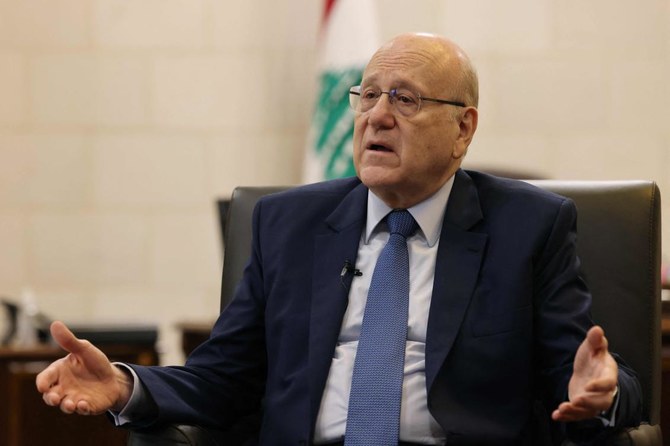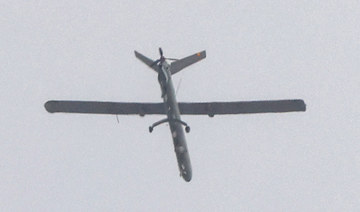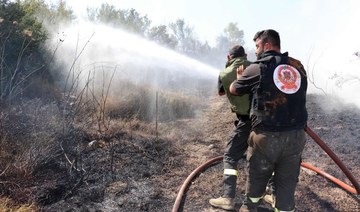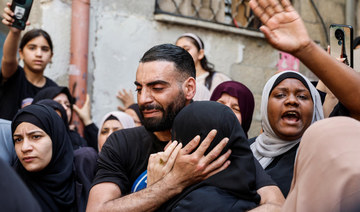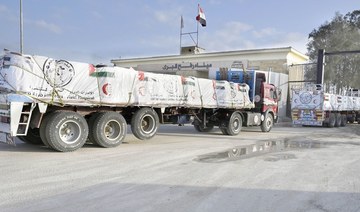BEIRUT: Lebanese Caretaker Prime Minister Najib Mikati has demanded an end to “Israeli provocations” on the southern border.
Lebanon is “in the eye of the storm” amid the tensions in the region, he told Sky News on Monday.
“If Lebanon enters the war, the whole region will be in a state of chaos, not just our country,” he said, adding that “efforts are ongoing to spare Lebanon from war.”
Mikati also told Sky News that the decision to go to war “is up to Israel if it continues to violate the Lebanese southern borders.”
He said that the Lebanese state was cooperating with international organizations to develop a plan in the event of war.
Mikati visited Qatar on Sunday, meeting Emir Sheikh Tamim bin Hamad Al-Thani.
The two sides discussed “the latest developments in the Palestinian territories and the region,” according to a statement issued after the meeting.
In a phone call with Australian Foreign Minister Penelope Wong, Lebanese caretaker Foreign Minister Abdallah Bou Habib said that “Israeli threats to attack and destroy Lebanon are of no use.”
Military operations along Lebanon’s southern border have taken place since the early morning, including sporadic artillery shelling and airstrikes.
Israeli forces had fired flares and incendiary shells over southern villages adjacent to the Blue Line, resulting in forest fires.
The Israeli army on Monday also targeted the perimeter of the Al-Raheb Israeli outpost — at the border with the Aayta Al-Shaab village — with 12 missiles, including phosphorus missiles.
A missile fell in an empty region located between the villages of Aynata and Kunin for the first time since the start of military operations in southern Lebanon, which began simultaneously with Operation Al-Aqsa Flood.
According to a military observer, the two villages remain within UNIFIL’s operational region.
The Israeli attack reached 5 km inside the Lebanese border, said the observer.
Israeli jets raided the outskirts of the Yater village, as well as the Aayta Al-Shaab village, targeting an empty house and the perimeter of the Shebaa Farms. Israeli artillery also targeted the Al-Labbouneh region, located in Naqoura, with dozens of artillery shells and flares, causing fires.
Maj. Gen. Raymond Khattar, director general of the Lebanese Civil Defense, said on Monday that “the fire danger index is high today and distinguishing fires is hard amid the ongoing bombardment and the presence of mines and cluster bombs.”
He added: “We are coordinating with the UNIFIL forces so they can intervene to avoid endangering our members.”
The Lebanese army announced on Monday that “21 missile platforms with an unlaunched rocket were found in Wadi Al-Khansaa and Al-Khraybeh — Hasbaya district — and in Al-Qlaileh – Tyre district,” adding that “they were dismantled by the competent units.”
The military observer told Arab News: “The bombing of the UNIFIL spots during the past weekend is Israel’s way of expressing its dissatisfaction with the UN.”
The observer said that the UNIFIL leadership was facing difficulty in communicating with the Israeli side amid claims by the latter that the peacekeeping force was “not fulfilling its duties consisting of preventing illegal weapons in its operational region.”
In other news, a Hezbollah member was killed during military operations carried out by the party on the southern front on Monday.
Although operations carried out by Palestinian factions in southern Lebanon against Israeli forces have subsided, a Lebanese military group called “Fajr Al-Jouroud” has emerged in recent days.
The group identifies itself as the military wing of the Jamaa Islamiya group and announced on Sunday it had “targeted many outposts of the Israeli enemy in the Kiryat Shmona settlement and its surroundings.”
The military observer said: “The operations of this group are carried out in full coordination with Hezbollah, as it doesn’t own the type of weapons used in its operations.”
He added: “The presence of the group is beneficial for Hezbollah in the Sunni border regions opposing the party, as the Islamic group is a political movement that has become one of Hezbollah’s allies after being against it in the past.”
The group organized a mass demonstration last Sunday, in coordination with Hamas, in downtown Beirut.
Buses carrying demonstrators – including Palestinian refugees and Lebanese – from Tripoli, Bekaa and Saida, were decorated with the Palestinian flag and the Hezbollah and Hamas banners. Members of Hezbollah’s Islamic Health Organization accompanied the demonstrators.
Hezbollah also announced that its chief, Hassan Nasrallah, will deliver a speech next Friday during a ceremony honoring fighters who died during operations.
It will be Nasrallah’s first public appearance since Operation Al-Aqsa Flood was launched.
Pending Nasrallah’s statements, which Lebanese fear will be incendiary, Hezbollah Executive Council deputy head, Sheikh Ali Damoush, said that the party “is fully prepared and ready to face all the options and developments accurately, wisely and with the highest degree of national responsibility.”
Damoush added that “Hezbollah’s vision considers the requirements of conflict with the enemy, the interest of the resistance, national interest and people’s interests,” adding that “all our stances and actions are taken accordingly.”
In a joint meeting held on Monday, the Saydet Al-Jabal Gathering and the National Council to End Iranian Occupation in Lebanon”recalled “Resolution 1701, which cost Lebanon 2,500 martyrs and billions of dollars in losses.”
They feared the international resolution, which aimed to bring an end to the 2006 war, was “being jeopardized today by an external decision,” accusing “Iran and its militias of using Lebanon and its people as ammunition to fuel the Iranian project in the region.”



